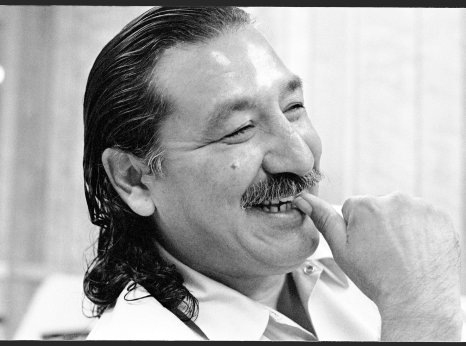USA: Urge Parole For Native American Activist

Leonard Peltier, an Anishinaabe-Lakota Native American, was a member of the American Indian Movement (AIM), which promotes Native American rights. On 26 June 1975, during a confrontation involving AIM members on the Pine Ridge Indian reservation in South Dakota, FBI agents Ronald Williams and Jack Coler were shot dead. Joseph Stuntz, a Native American and member of the American Indian Movement, was also killed that day. Mr. Stuntz’s death was never investigated nor was anyone charged in his death. With respect to the murder of Agents Coler and Williams, Leonard Peltier was convicted in 1977 and sentenced to two consecutive life sentences. Leonard Peltier has always denied killing the agents.
A key alleged eyewitness to the shootings was Myrtle Poor Bear, a Lakota Native woman who lived at Pine Ridge. Based on her statement that she saw Leonard Peltier kill both FBI agents, Leonard Peltier was extradited from Canada, where he had fled following the shootings. However, Myrtle Poor Bear later retracted her testimony. Although not called as a prosecution witness at trial, the trial judge refused to allow Leonard Peltier’s attorneys to call Myrtle Poor Bear as a defence witness on the grounds that her testimony “could be highly prejudicial to the government”. In 2000, Myrtle Poor Bear issued a public statement to say that her original testimony was a result of months of threats and harassment from FBI agents.
In 1980, documents were released to Leonard Peltier’s lawyers as a result of a lawsuit under the Freedom of Information Act. The documents contained ballistics evidence which might have assisted Leonard Peltier’s case, but which had been withheld by the prosecution at trial. However, in 1986, the U.S. Court of Appeal for the Eighth Circuit denied Leonard Peltier a retrial, stating that: “We recognize that there is some evidence in this record of improper conduct on the part of some FBI agents, but we are reluctant to impute even further improprieties to them”.
James H. Reynolds, the US Attorney whose office handled the criminal case prosecution and appeal of Leonard Peltier, wrote that he supported clemency “in the best interest of Justice in considering the totality of all matters involved”.
Leonard Peltier suffers from a variety of ailments, including kidney disease, Type 2 diabetes, high blood pressure, a heart condition, a degenerative joint disease, and constant shortness of breath and dizziness. A stroke in 1986 left him virtually blind in one eye. In January 2016, doctors diagnosed him with a life-threatening condition: a large and potentially fatal abdominal aortic aneurysm that could rupture at any time and would result in his death. He currently uses a walker due to limited mobility and contracted COVID-19 in 2022. He continues to be at risk of re-infection while in detention.
In 2015, several Nobel Peace Prize winners—including Archbishop Desmond Tutu—called for Leonard Peltier’s release. The Standing Rock Sioux Tribe, the National Congress of American Indians, many Tribal Leaders, the U.N. Working Group on Arbitrary Detention, and Members of Congress have also called for his release. Leonard Peltier’s attorney applied for clemency to President Biden in July 2021. President Biden committed to granting clemency on a rolling basis during his administration. However, as of May 2024, no decision has been made on his application. He has previously sought clemency, most recently from President Obama in 2016, but his petition has been denied each time. Due to the numerous issues at trial, the exhaustion of all his legal avenues for appeal, the amount of time he has already served, his continued maintenance of innocence along with his chronic health issues, Amnesty International supports calls for the release of Leonard Peltier.